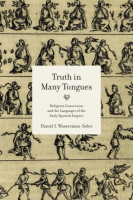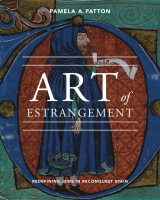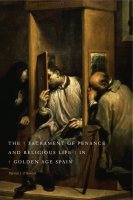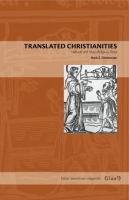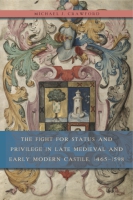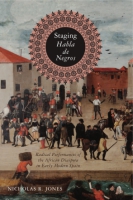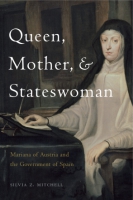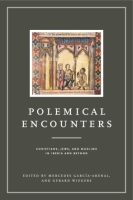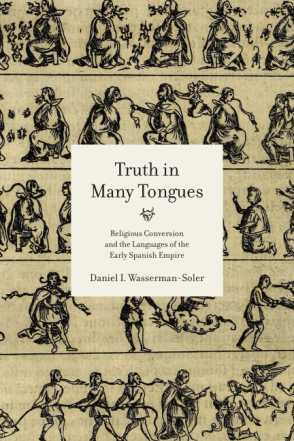
Truth in Many Tongues
Religious Conversion and the Languages of the Early Spanish Empire
Daniel I. Wasserman-Soler
Truth in Many Tongues
Religious Conversion and the Languages of the Early Spanish Empire
Daniel I. Wasserman-Soler
“This book offers an exciting glimpse into the development of Spanish linguistic policy regarding conquered peoples in the early modern period on both sides of the Atlantic. It is a courageous undertaking, confronting the Spanish efforts to evangelize first the Arabic speakers devoted to Islam on the Iberian Peninsula and then come to grips with the multifaceted linguistic challenge of converting indigenous peoples in the Americas to Christianity.”
- Description
- Reviews
- Bio
- Table of Contents
- Sample Chapters
- Subjects
Daniel I. Wasserman-Soler investigates the subtle and surprising ways that Spanish monarchs and churchmen thought about language. Drawing from inquisition reports and letters; royal and ecclesiastical correspondence; records of church assemblies, councils, and synods; and printed books in a variety of genres and languages, he shows that Church and Crown officials had no single, unified policy either for Castilian or for other languages. They restricted Arabic in some contexts but not in others. They advocated using Amerindian languages, though not in all cases. And they thought about language in ways that modern categories cannot explain: they were neither liberal nor conservative, neither tolerant nor intolerant. In fact, Wasserman-Soler argues, they did not think predominantly in terms of accommodation or assimilation, categories that are common in contemporary scholarship on religious missions. Rather, their actions reveal a highly practical mentality, as they considered each context carefully before deciding what would bring more souls into the Catholic Church.
Based upon original sources from more than thirty libraries and archives in Spain, Italy, the United States, England, and Mexico, Truth in Many Tongues will fascinate students and scholars who specialize in early modern Spain, colonial Latin America, Christian-Muslim relations, and early modern Catholicism.
“This book offers an exciting glimpse into the development of Spanish linguistic policy regarding conquered peoples in the early modern period on both sides of the Atlantic. It is a courageous undertaking, confronting the Spanish efforts to evangelize first the Arabic speakers devoted to Islam on the Iberian Peninsula and then come to grips with the multifaceted linguistic challenge of converting indigenous peoples in the Americas to Christianity.”
“This book will no doubt encourage scholars to test further the bird’s eye view of changing norms against the social history of Spanish in the Iberian and colonial overseas contexts, where multiple languages and cultures coexisted and transformed, and the hierarchies among them endured.”
“Wasserman-Soler’s book is a meaningful contribution to the religious history of the Spanish Habsburg Empire that works across the fields of early modern and Reformation studies, colonial Latin American history, and early modern transatlantic studies. His work suggests far greater continuity between Spain prior to 1492 and during the sixteenth century than previously postulated and argues against the dominant view that sixteenth-century officials dogmatically sought to spread Castilian as the language of the empire.”
“Truth in Many Tongues is an important contribution to mission history because it situates Catholic missionary approaches to language and religious conversion in both Atlantic and local contexts. The book is another reminder that Spanish approaches to colonization were always shaped and transformed by the local peoples they encountered across the empire.”
“Truth in Many Tongues will be necessary reading for any study of language and religious conversion in premodern European and colonial contexts.”
“It provides a nuanced and welcome interpretation of clerical attitudes toward languages, theology, and indoctrination that enriches the field.”
Daniel I. Wasserman-Soler is Associate Professor of History at Alma College.
List of Illustrations
Acknowledgments
Note on the Text
Introduction
1. The Spanish Language and the Inquisition, ca. 1550–1600
2. Arabic and Spanish in Granada, ca. 1492–1570
3. Arabic and Romance in Valencia, ca. 1540–1600
4. Native Tongues and Spanish in New Spain, ca. 1520–85
5. Creating a Multilingual New Spain, ca. 1550–1600
Conclusion
Appendix: Linguistic Abilities of Franciscan Friars in Sixteenth-Century
New Spain
Notes
Bibliography
Index
From the Introduction
In the sixteenth century, Spanish monarchs ruled over perhaps the most linguistically diverse kingdoms in the world. Inhabitants of Iberia spoke Arabic, Basque, Castilian, Catalan, Ladino, or another Romance language. Iberians lived in a land of many tongues, but they still were astonished by the number of languages that they encountered in the Americas. No short list could do justice to the immense range of both languages and language families in the “New World.” And the Spanish Empire extended well beyond America and into the Pacific islands. How Spanish authorities dealt with a dizzying range of languages is the subject of this book.
One example will help explain. In 1567 King Philip II (fig. 1) prohibited Granada’s Islamic community from speaking Arabic. He and leading churchmen thought that the language prevented conversions to Christianity. One might assume that Philip took similar action across his kingdoms, pushing his native Castilian and restricting the languages of other peoples.
Philip, however, never issued a comparable ban of Native American languages. In fact, he seems to have done the opposite. Throughout his reign, he urged churchmen in the Americas to devote themselves to learning native tongues. He did not even enact the same restriction of Arabic throughout Castile; that initial decree applied only to Granada. To the modern reader, this way of thinking may appear contradictory. This book argues that Philip’s mode of thought actually was common among churchmen in the sixteenth-century Spanish kingdoms.
This anecdote points to three surprising aspects of sixteenth-century Spanish thought and practice regarding languages in both Iberia and the Americas. First, sixteenth-century Spanish authorities demonstrated less interest in propagating Castilian than we might think. Although that language eventually became widespread, Spanish officials had no unified policy aiming to promote Castilian during the first century of expansion. Spanish monarchs and leading churchmen put much more effort into encouraging the use of American indigenous languages. Some influential clerics also called for and used Arabic, though they were far fewer in number. Within this general framework, there existed many variations.
Second, just as Philip and his leading churchmen had no uniform approach with Castilian, they also had no set policy for the use of other languages. One might assume that they would have taken one of two routes in governing this multilingual body of subjects. On the one hand, they might have accommodated the people’s linguistic differences, allowing everyone to speak the language of their choice. On the other hand, they might have forced everyone to assimilate to Castilian. They did neither one exclusively. They restricted Arabic in some contexts and not in others; they advocated the use of Amerindian languages but not in all cases. Sixteenth-century Spanish churchmen thought about language in ways that modern categories cannot explain: they were neither liberal nor conservative, neither tolerant nor intolerant. In fact, they did not think only or even predominantly in terms of accommodation or assimilation—categories that remain common in much contemporary scholarship on missions. Rather, their actions reveal a highly practical mentality, in which they considered each context on its own terms before deciding what language practices would help bring more souls into the Catholic Church.
In several cases, Spanish religious leaders called for and implemented multilingual methods to foster religious conversion. Even when a language seemed useful for one context, it was not necessarily appropriate elsewhere. Thus in spite of heterogeneous and often polyglot methods, the Spanish Empire was no multilingual utopia. Churchmen often restricted the vernaculars to certain contexts, and religious leaders did, on some occasions, actively lobby against particular ways of using a language. The Spanish Crown and its churchmen, therefore, did not accommodate all languages at all times. Still, throughout the sixteenth century, they never adopted a firm policy of eliminating all foreign cultural markers. As a whole, early modern Church leaders thought about language in a situation-specific way. They viewed some vernaculars as appropriate for certain contexts but not for others. They did not demonstrate a firm commitment to propagating one language above all others.
Finally, in the minds of many sixteenth-century Spanish officials, the languages of the people were somewhat less central to effective religious instruction than we might expect. For the modern reader, it may seem obvious that the vernaculars would serve as the sine qua non of successful catechesis. Without dismissing the obvious utility of the people’s languages, several churchmen troubled the notion that the vernaculars stood at the center of conversion efforts. Chapter 1 demonstrates that several churchmen, such as the Dominican friar Melchior Cano, thought that the increasing availability of Castilian prayer books could, in fact, hinder proper religious instruction rather than help it. Chapters 2 and 3 indicate that churchmen who lacked Arabic still made important contributions to the evangelization of Islamic communities while speaking only in Castilian or Valencian. While the Jesuit Juan de Albotodo preached in Arabic, most of the Jesuit priests and brothers in Granada worked only or primarily in Castilian. Despite their linguistic limitations, both their contemporaries and modern historians agree that they had some success in their efforts to convert Granada’s Islamic community. The last two chapters show, similarly, that even those men who struggled to learn Amerindian languages still could participate meaningfully in the instruction of native peoples. While the Franciscan friar Alonso de Molina demanded that every cleric know an indigenous language and know it well, others—such as his fellow Franciscan Maturino Gilberti—apparently considered this standard impractical. Gilberti and others appear to have accepted that some churchmen would not learn the local languages very well, so they produced lengthy collections of sermons and reflections. With these aids, even the less linguistically adept missionaries could simply learn to read the text aloud to their indigenous flock.
In general, Spanish churchmen did consider the vernaculars very useful. In some situations, however, it was not always possible or appropriate to use the language of the people. For virtually all the churchmen examined here, the best means for teaching Christian doctrine consisted of living virtuously and encouraging—by their example—participation in the sacraments and the life of the Church. The fact that they often did not use the languages of the people did not—in their minds—lead necessarily to failure. Instead, it meant that they saw the vernacular languages as highly useful tools but not as the only method of religious conversion.
The Diversity of the Spanish Empire
In the sixteenth-century Spanish kingdoms, Catholic clerics worked with a wide range of people, who had varying levels of knowledge regarding Christian doctrine. Most residents of Castile and Arag.n had been Christian for centuries, yet they often lacked religious instruction. For this reason, many churchmen used the term “Indies” to underline the need for basic religious instruction in Europe.5 Muslims in Europe had been aware of Christianity for centuries and—for the most part—had rejected it. The indigenous peoples of America had no exposure to Christianity prior to 1492. Each group was diverse and presented distinct challenges.
Before addressing the peoples studied in this book, it is important to explain the absence here of two major groups within the Spanish kingdoms: African and Jewish communities. Both appear only briefly because little documentation exists regarding the place of language in the religious instruction of Africans and Jews. When the bishops of Mexico discussed the conversion of Africans at the Third Provincial Council of Mexico (1585), they recommended that ministers use the Castilian language. The choice of Castilian probably was a practical one: slave traders brought Africans to the Americas without regard for preserving their linguistic communities.6 Thus Africans who lived in a particular area in the Americas did not necessarily share a language. Churchmen faced another challenge with Africans: they spent relatively little time with African slaves, because the latter belonged to Spanish masters. Theoretically, the masters had the duty of providing them with religious instruction.
While clerics’ relative lack of contact with Africans may explain the paucity of sources addressing language practices for their evangelization, no substantial linguistic barrier existed for the instruction of Jewish communities. Because Jews and conversos (Christians of Jewish descent) spoke Ladino, a Romance language bearing strong similarities to Castilian, Church authorities in sixteenth-century Spain generally did not face a linguistic obstacle in communication with them. By the end of the Reconquista in 1492 and afterward, Jews increasingly spoke Romance languages, except in religious practice and literary culture, both of which utilized Hebrew as the language of choice. That said, the study of Hebrew scripture by Christian scholars did provoke a significant controversy in sixteenth-century Spain. It posed a particular problem for scripture scholars who found themselves suspected of heresy.8 The chapters that follow focus on a different problem: how to use language to instruct a broader populace who lacked formal training in theology.
For priests who instructed the people, each situation required a different set of languages. Most of the traditionally Christian (or “Old Christian”) peoples spoke Castilian or another Iberian Romance language (e.g., Catalan, Galician, or Valencian). Some relied on Basque, a linguistic isolate, unrelated to any Indo-European language. Churchmen also could instruct others through religious writing, but much of it remained limited to those people who knew Latin well.
Spanish Muslims, similarly, used a variety of languages. In 1492 the Muslims of Granada had just become subjects of a Christian monarchy for the first time. At that moment, they spoke Arabic and had limited knowledge of Castilian. The Muslims of Valencia, however, had been under Christian rule for over two hundred years. While Arabic remained an important language in sixteenth-century Valencia, many Muslims there spoke the local Romance language (Valencian). For centuries, Muslim writers had translated works from Arabic into Spanish and also into aljamiado (Spanish written with Arabic script).
In the Americas, indigenous peoples spoke hundreds of languages. Linguists in the twentieth century have identified over three hundred languages in Mexico and Central America and well over a dozen linguistic families in the same area. In fact, just one portion of Mexico had a degree of linguistic diversity that surpassed entire continents of the “Old World.” Altogether, no sixteenth-century community across the globe had a wider range of languages than the Spanish Crown.
According to established accounts, Spanish churchmen initially responded with flexibility to these heterogeneous circumstances. In mid-sixteenth-century Spain, churchmen such as John of .vila, Francis Borgia, Bartolom. Carranza, and Louis of Granada published vernacular Castilian books of prayer and doctrine. In doing so, they aimed to expand the traditionally Latin corpus of Christian writing and engage a wider audience. Their attempts came under suspicion in 1559, when the Spanish Inquisition prohibited several vernacular books of prayer and doctrine.
Interest in Arabic, similarly, appears to have risen and fallen. For instance, Hernando de Talavera, archbishop of Granada (1492–1507), encouraged Muslims to pray in Arabic. Around the turn of the century, Granada’s Muslims faced the unattractive choice of conversion to Christianity or departure from Iberia. Those who stayed accepted baptism and became known as Moriscos, or “New Christians” of Islamic descent. By the mid-sixteenth century, virtually all Moriscos in the city would have known some Castilian, at least enough to put together a few broken sentences. Still, many continued to use Arabic, especially the inhabitants of rural areas. In 1565 the bishops of Granada agreed that Moriscos should be discouraged from using Arabic, and King Philip II agreed. He issued a royal order to prohibit Granada’s Moriscos from using Arabic.
In America, the Church’s interest in indigenous languages took on a much more profound and long-lasting nature, compared to Arabic. Dozens and dozens of churchmen learned a native language, and many learned more than one. But by the late eighteenth century, the archbishop of Mexico City and King Charles III agreed to suppress indigenous languages. Altogether, the Church and Crown eventually favored the propagation of Castilian Spanish and the restriction or elimination of Arabic in Spain and of native tongues in America.
Contributions to Current Scholarship
From this general view, sixteenth-century Spain became increasingly homogeneous, rejecting dissident beliefs and cultures. The flexibility of early generations seems to have given way to a more rigid dogmatism. Much evidence corroborates this outlook, given that Spanish kings and churchmen clearly have a record of attempting to restrict if not prohibit certain languages. This emphasis within existing scholarship tends to oversimplify the story. It suggests that, beginning around midcentury—more or less during the Council of Trent (1545–63)—churchmen became either more closed or intransigent, as it were, or they eventually lost out to men who espoused
such perspectives.
This book aims to modify that story. It demonstrates that these churchmen thought about language in subtler ways, largely ignored until now. The many variations in their thoughts and practices regarding language reveal themselves in a wide range of documents—inquisition reports and letters; royal and ecclesiastical correspondence; records of Church assemblies, councils, and synods; and printed books in a variety of genres and languages—scattered across more than thirty archives and libraries in Spain, Italy, England, the United States, and Mexico. Church and Crown officials thus had no single, unified conversation or debate regarding language and religious conversion in the sixteenth-century Spanish territories. Rather, their discussions usually addressed specific problems, taking place in particular circumstances. Altogether, in the second half of the sixteenth century, Spanish churchmen shared much in common with earlier generations. They operated with a surprising degree of flexibility not only in the early 1500s but throughout that century.
Excerpt ends here.
Mailing List
Subscribe to our mailing list and be notified about new titles, journals and catalogs.
